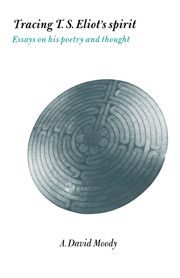6 - The Waste Land: ‘To fill all the desert with inviolable voice’
Published online by Cambridge University Press: 05 November 2011
Summary
‘Gesang ist Dasein’
(Rilke, Sonette an Orpheus, 1.3)When Eliot said, in 1947, that he had written The Waste Land ‘simply to relieve his own feelings’, he was in effect dismissing it as unworthy of serious consideration when judged by the criteria of ‘Tradition and the Individual Talent’. A poem which simply gave relief to the poet's own feelings could be neither Impersonal nor Traditional. The remark also amounted to a dismissal of those critiques of the poem which had hailed it as expressing the disillusionment of his generation and the breakdown of European culture. One may suspect that Eliot was slily seeking to re-order the monuments of his own career, and to set the then fairly recently completed Four Quartets in place of The Waste Land as the more orthodox and culturally significant achievement. Yet the dismissive remark did subversively point up a hitherto repressed quality of The Waste Land, its burden of profound personal emotion.
It may be that since 1947, and especially since the publication of the original drafts, and of Lyndall Gordon's psycho-biography, The Waste Land has been too much read by the lights and shadows of what is known or guessed about Eliot's private life. Nonetheless, it has become evident that the poem is most deeply engaged in working out a set of personal feelings. Eliot acknowledged them to be his own, but, fortunately, they have an existence in the poem quite independent of him.
- Type
- Chapter
- Information
- Tracing T. S. Eliot's SpiritEssays on his Poetry and Thought, pp. 115 - 134Publisher: Cambridge University PressPrint publication year: 1996



